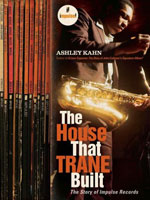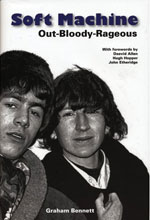Recent reading: music books, October 2006

Both Ashley Kahn’s The House that Trane Built. The story of Impulse Records (Granta),and Rob Young’s Rough Trade (Black Dog) take a similar approach to their record label subjects: a chronological history mixed with specific photographs and reviews of major releases. Impulse! staked their reputation on avant-garde jazz, and sold millions of their instantly recognisable LPs, whilst Rough Trade were originally the archetypal indie label, over the years and their several incarnations releasing everything from dub and punk thrash, to handmade industrial noise and hybridised experiment, via riot grrl and fey pop. Both labels made a major impact; both struggled in the long run – although Impulse! have started a major reissue programme recently and Rough Trade have resurrected again following buyouts and bankruptcies.
Rough Trade are ‘my era’ of course, so it’s fascinating seeing pictures of the old shop where I used to buy stuff, the staff who would advise and chat, and looking at some long-lost old favourite record releases. It’s an amazing and eclectic list. What’s especially interesting from the perspective of time is that both labels released strangely out-of-place and unexpected records. But then neither label were totally business-oriented; both were driven by a love of music. And of course the –to my mind - inexplicable and undeserved success of The Smiths, all whine and whinge, pose and preen, shows that the even Rough Trade’s catholic, if not ramshackle, approach, paid off in the end. It’s just a shame the book wastes so many pages on Morrisey and co.
The Rough Guides to... have been redesigned and reissued. One of the first on the shelves is The Rough Guide to Punk, which is a very strange beast indeed. The editors have applied the word ‘punk’ not to a time period but to some undefined dress code or attitude, so 90s grunge bands rub shoulders with punk and post-punk outfits, whilst the likes of Crass are simply ignored.

Crass were always derided for taking their politics seriously, and for their unlistenable music,but surely they deserve an entry? After all, they did attempt to be the conscience of thousands of leather-clad vegetarian punks. Two other titles would suggest I’m not alone in them having a place in musical and social history… George Berger’s The Story of Crass (Omnibus) is a chronological band biography, which reveals a surprisingly human and non-PC side to the group. Steve Ignorant clearly lives up to his pseudonym, and should have been in a heavy metal band where he could indulge in drink, drugs and sex to his heart’s content. The rest of the band do little in the end to explode their po-faced reputation, although if anything they come across as generally aloof, unaware and unfocussed; a strange mix of secondhand performance art, agit-prop and bumbling good intentions. There’s some fascinating detail revealed, but that’s all. And Crass. The Love Songs (Pomona), a paperback edition of their lyrics simply proves that rant and polemic doesn’t make for good writing, however heartfelt and well-intentioned. I think I’ll stick to my battered copy of A Series of Shock Slogans and Mindless Token Tantrums, which they always claimed was for those who liked the message but hated the music. Count me in.
More seriously anarchic and intriguing music was provided by the early incarnations of Soft Machine. Graham Bennet’s Soft Machine. Out-Bloody-Rageous (SAF) is a well-written and researched, if slightly earnest, study of the band, from their avant-garde hippy roots to their jazz-rock demise. If it’s all a little too po-faced for its own good, and rather defensive of their late ouput and decline, it nevertheless contains a wealth of detail and information, and includes interviews with and quotes from most Soft Machine players. I could do without the amateur pyshcology on show at times about how miserable everyone in the band was and why, and I certainly lost interest in reading about events after Bundles was released (just as most listeners did), but this will sit neatly on my shelf next to SAF’s book on Robert Wyatt.
From the same timewarp as Soft Machine came Pink Floyd. Given a different climate or set of opportunies their roles could have been reversed, but it’s Floyd who hit the big time and who have a Rough Guide to about them. Mind you, it’s pretty useless, being full of unsubstantiated opinions and strangle irrelevant details. The best 50 tracks are a joke, as are many of the track or album appraisals. Has the author actually heard the Animals bootleg? If he had he wouldn’t question why many fans regard it as better than the legitimate release, nor why – in its full colour sleeve (which conspiracy theorists always claimed was funded by the band)– many fans thought it was an official releases. The blow-by-blow account of Waters vs. Gilmour is hilariously detailed and drawn-out [and, it seems to me, totally irrelevant to the music]. This really is a potboiler, and I should ahve spotted the fact before wasting my money. Ah well, set the controls….
© 2006 Rupert Loydell